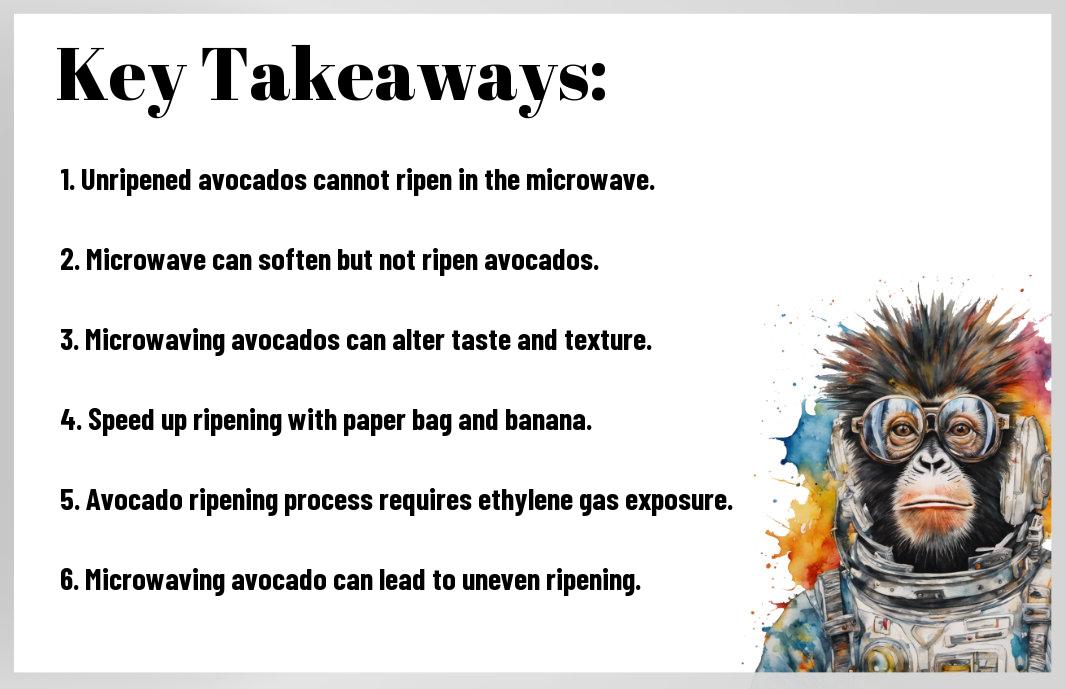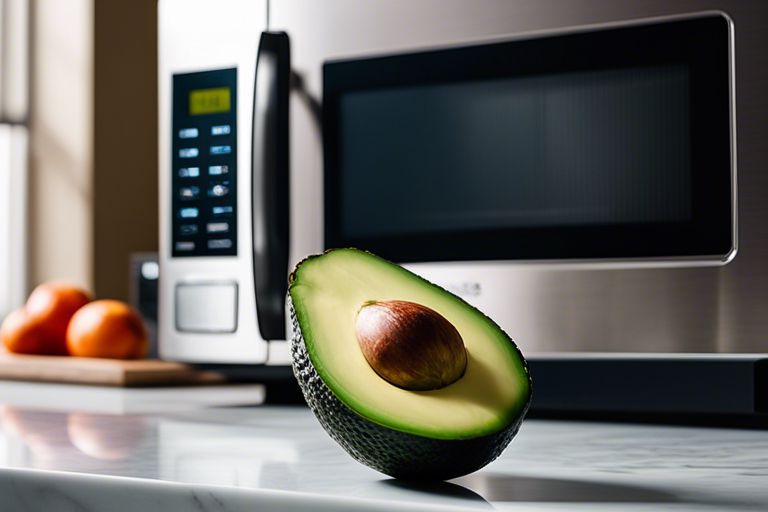Ripen an avocado in the microwave? It might sound like a crazy idea, but desperate times call for desperate measures! If you’re in a pinch and need a ripe avocado ASAP, the microwave could be your new best friend. Let’s probe the world of food science and see if this unconventional method actually works. Before you press that start button, let’s find out if a perfectly ripe avocado is just a few beeps away!
Key Takeaways:
- Quick Fix: Microwaving an avocado can help ripen it faster, but there is a risk of altering the taste and texture.
- Proper Techniques: To ripen an avocado in the microwave, wrap it in a paper towel and heat for short intervals to avoid cooking the fruit.
- Alternative Methods: For best results, it is recommended to use traditional ripening methods like placing the avocado in a paper bag with a banana or apple.

The Science of Avocado Ripening
Before we probe the microwave method of ripening avocados, let’s break down the science behind how these green gems transition from rock hard to buttery perfection. Avocados don’t ripen on the tree; instead, they mature and soften after being harvested. The key players in this ripening process are ethylene and a group of enzymes that work together to transform the avocado’s texture.
Ethylene Production and Fruit Maturation
Any fruit that continues to ripen after being picked, like avocados, generates a naturally occurring plant hormone called ethylene. This colorless and odorless gas plays a crucial role in signaling the fruit to produce enzymes that break down cell walls and starches, leading to softening and maturation. Avocados are considered climacteric fruits, meaning they continue to ripen post-harvest with the help of ethylene.
The Role of Enzymes in Softening Avocados
Ethylene triggers the production of enzymes such as cellulase, polygalacturonase, and pectinase in the avocado. These enzymes work together to degrade complex carbohydrates, like pectin, into simpler sugars, resulting in a softer texture. The breakdown of these compounds is what transforms a hard, unripe avocado into a creamy, delicious fruit ready for guacamole or toast topping.
Can Microwaves Really Ripen Avocados?
Some avocado enthusiasts may wonder if they can speed up the ripening process by using the microwave. While it’s true that microwaving avocados can soften them, the question remains whether this method can truly ripen them.
The Microwave’s Effect on Avocado Cells
Microwaves work by exciting water molecules, causing them to vibrate and generate heat. When applied to avocados, this heat can break down the cell walls and soften the fruit, giving the impression of ripening. However, this method may not fully replicate the natural ripening process that occurs over time.
Heat, Water, and the Maillard Reaction
Cells in the avocado contain enzymes and compounds that react to heat and water. The microwave’s heat can trigger the Maillard reaction, a chemical response between amino acids and sugars that gives browned foods their distinct flavor. In the case of avocados, this process can alter the taste and texture, but it may not result in the same complex flavors that develop during the natural ripening process.
Avocados naturally ripen through a series of enzymatic reactions that break down starches into sugars and soften the fruit. While microwaving can soften an avocado, it may not fully replicate the flavor and texture that comes from allowing the fruit to ripen naturally over time.
The Experiment: Microwaving Avocados
After contemplating whether it was possible to ripen an avocado in the microwave, I decided to conduct an experiment to put this idea to the test. The goal was to find out if using the microwave could accelerate the ripening process of an unripe avocado.
Methods and Materials
One ripe avocado, one unripe avocado, a microwave-safe dish, a paper towel, and a microwave were the main materials used for this experiment. The unripe avocado was placed in the microwave for short intervals to determine if it would soften and ripen quicker than if left out at room temperature.
Observations and Results
Avocados subjected to short bursts in the microwave did show some signs of softening compared to the control avocado left at room temperature. However, the avocados did not ripen uniformly, resulting in some parts being overripe while others remained hard. The experiment indicated that while microwaving avocados may soften them slightly, it does not necessarily ripen them evenly.
Avocados are unique fruits that undergo a ripening process after they are harvested. This process involves the conversion of starches into sugars, leading to a creamy texture and rich flavor. While the microwave can provide a shortcut to soften an avocado, it may not replicate the natural ripening process adequately.

The Verdict: Does it Work?
The Good: Softening and Browning
Browning: Concerning ripening an avocado in the microwave, it can indeed help soften the fruit and even induce some browning on the skin. This can be a quick fix if you’re in a pinch and need a ripe avocado for your recipe.
The Bad: Uneven Ripening and Texture Issues
Browning: While the microwave can speed up the ripening process, it may not always result in an evenly ripened avocado. The heat from the microwave can sometimes cause the fruit to overripen in some areas while leaving other parts underripe.
Uneven: Additionally, using the microwave to ripen an avocado may lead to texture issues. The flesh may become overly mushy or develop an off-putting flavor due to the intense heat exposure.
Alternative Methods for Ripening Avocados
Many avocado enthusiasts know the struggle of buying unripe avocados and waiting impatiently for them to soften. While the microwave can be a tempting solution for a quick ripening fix, there are alternative methods that can help you achieve that perfect ripeness without compromising the taste and texture of your avocado.
Paper Bag and Banana Trick
The traditional paper bag and banana trick is a tried and tested method for ripening avocados. The natural ethylene gas produced by the banana helps speed up the ripening process of the avocado enclosed in a paper bag. Simply place the unripe avocado and a ripe banana in a paper bag and let them work their magic together. Check the avocado daily until it reaches your desired level of ripeness.
Brown Paper and Apple Method
For those who prefer not to use bananas, the brown paper and apple method can also be effective in ripening avocados. Similar to the banana trick, the apple emits ethylene gas that aids in the ripening process. Place the avocado in a brown paper bag with an apple and leave it at room temperature. Check on the avocado regularly to monitor its ripeness progress.
It’s important to note that the type of apple you use can impact the speed of ripening. Choose a ripe apple to accelerate the process or a less ripe one if you prefer a slower ripening pace.
Room Temperature and Patience
| Method | Instructions |
| Room Temperature | Place the avocado on the counter at room temperature away from direct sunlight. |
| Patience | Wait for 3-7 days for the avocado to ripen naturally. Check the avocado daily for ripeness. |
Room temperature is often the most reliable method for ripening avocados naturally. By allowing the avocado to ripen slowly at room temperature, you can ensure that the flavor and texture develop perfectly without altering the taste.
With
Tips and Tricks for Perfectly Ripe Avocados
Despite avocados being notoriously tricky to get just right, there are some handy tips and tricks that can help you achieve that perfectly ripe avocado every time. Here are some expert suggestions to ensure your avocados are always at their prime:
- Choosing the Right Avocado Variety
- Storing Avocados to Slow Down Ripening
- Speeding Up the Ripening Process Naturally
Choosing the Right Avocado Variety
An vital tip for selecting avocados that ripen well is to choose the right variety. Haas avocados are the most common, and they tend to have a creamy texture with a rich flavor when ripe. Look for avocados that are firm, but with a slight give when gently squeezed. Avoid avocados that are mushy or have dents.
Recognizing when an avocado is perfectly ripe is a skill that comes with practice. The fruit should yield to gentle pressure when squeezed, but not be too soft or mushy. If the avocado is still hard, leave it at room temperature to ripen further.
Storing Avocados to Slow Down Ripening
Avocados are highly sensitive to ethylene gas, a natural plant hormone that speeds up ripening. To slow down the ripening process, store avocados away from ethylene-producing fruits like apples and bananas. Keeping unripe avocados in the refrigerator can also help extend their shelf life.
Tips: To extend the life of a cut avocado, drizzle some lemon or lime juice over the exposed flesh and wrap tightly with plastic wrap before storing in the refrigerator.
Speeding Up the Ripening Process Naturally
To accelerate the ripening of an avocado, place it in a paper bag with a banana or apple. These fruits produce ethylene gas, which helps speed up the ripening process. Check the avocado daily until it reaches the desired level of ripeness, then transfer it to the refrigerator to slow down further ripening.
With proper handling and a bit of know-how, you can enjoy perfectly ripe avocados whenever you crave them. By selecting the right variety, storing them correctly, and using natural ripening methods, you can ensure your avocados are always at their best.
Summing up
Presently, we have explored the possibility and methods of ripening an avocado in the microwave. While it is not the ideal method for ripening avocados since it can alter the texture and flavor, in a pinch, it can help soften a hard avocado faster than traditional methods. However, it is necessary to use caution and monitor the avocado closely to prevent overripening or uneven ripening.
FAQ
Q: Can you ripen an avocado in the microwave?
A: No, you cannot ripen an avocado in the microwave. While the microwave can soften an avocado slightly, it will not ripen it properly.
Q: How do you know when an avocado is ripe?
A: To check if an avocado is ripe, gently press on the skin. If it gives slightly under pressure, it’s ripe. If it’s too soft or mushy, it’s overripe.
Q: What is the best way to ripen an avocado?
A: The best way to ripen an avocado is to place it in a paper bag with a banana or apple. The ethylene gas produced by these fruits helps speed up the ripening process.
Q: How long does it take for an avocado to ripen?
A: Depending on the avocado’s initial ripeness, it can take anywhere from 2 to 5 days for it to ripen in a paper bag at room temperature.
Q: Can you eat an unripe avocado?
A: Technically, you can eat an unripe avocado, but the taste and texture will not be pleasant. It’s best to wait until the avocado is fully ripe for the best eating experience.
